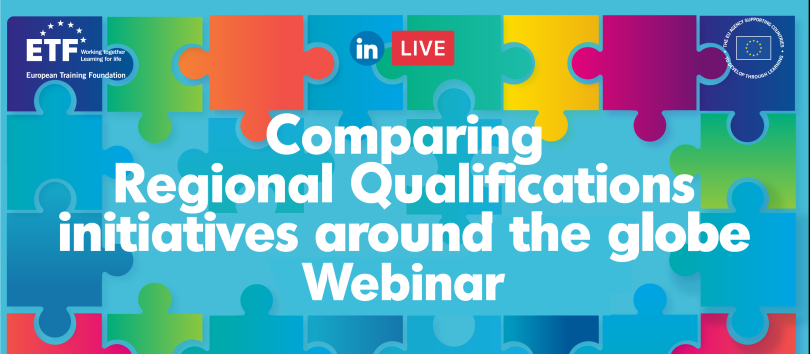
Comparing regional qualifications framework initiatives around the globe
Seventeen Regional Qualification Frameworks (RQFs) initiatives exist at some stage of development around the world. Based on a recently published study by the European Training Foundation, the people running these initiatives want to collaborate and exchange information with their peers worldwide. A pilot project linking the 27-country European Union (EU) with the 16-country Southern African Development Community (SADC) has been launched. Other similar endeavours are envisioned.
Those were the main takeaways from two online interactive sessions on 19 May called “Comparing regional qualification initiatives around the globe,” sponsored by the ETF. One with French translation, the other with Spanish, the two events included dozens of participants from around the globe.
The European Qualification Framework (EQF) largely informed the work of researchers as they learned about other programmes, but it is considered just one among a wide range of initiatives.
“Comparison means treating qualifications frameworks as equal partners,” said Koen Nomden, team leader of the DG EMPL at the European Commission. “Dialogue and mutual respect are keys to any comparison exercise.”
Speakers provided short overviews of all of the leading RQFs around the world, and then highlighted some common threads. As outlined by Monika Auzinger of 3S, main issues include:
· “Ownership” of the initiative – This is linked to the level of commitment of the actors. Often these efforts involve international donors. Most initiatives are linked to regional economic integration policies.
· What they want to achieve – Many, for example, aim to promote the mobility of workers and learners by making sure that their diplomas, certificates and other evidence of learning are accepted in all member states; transparency and comparability of qualifications are key, moving towards increased harmonization
· The importance of the goals of the relevant regional intergovernmental organization
· The scope of the programme, e.g., whether on higher education, vocational education and training, lifelong learning, a combination, etc.
Most RQFs find themselves in a developmental stage. Of the 17, only three are considered to be “fully operational,” meaning that they are in line with the all of the relevant national qualifications frameworks (NQFs), according to Arjen Deij of the ETF. He outlined a series of key factors that he called the Five Cs:
· COVID-19 – the pandemic has had a huge impact on all of the countries that are involved in RQFs, most of which are low and middle income
· Common Qualifications – among some nations of the Caribbean, for example, a framework pre-dates the existence of a formal RQF body, thereby setting an interesting precedent
· Climate Change and Green Growth – a changing world requires new skills
· Catalogues and Databases
· Common Guidelines
As RQFs evolve, notably in Africa, there are three possible scenarios, said Eduarda Castel Branco of the ETF. The first would establish connections, with peer learning, capacity development and the creation of shared tools. A further step would involve the establishment of mutual trust, which would involve things such as closer networking, the alignment of qualifications, and the recognition of prior learning. A higher stage, which she called “new horizons,” would lead to the widespread acceptance of an agreed-upon qualifications framework with automatic mutual recognition and, in the case of Africa, growing international acceptance of qualifications awarded on the continent.
In breakout groups, participants discussed two issues: (1) the most pressing needs for RQFs that can be addressed by international cooperation, and (2) how to establish and improve such collaboration. Castel Branco summed up some of the main proposals that emerged from the discussions.
In terms of issues that can be at least partially addressed by international cooperation, she listed:
· sharing experiences and tools among RQFs
· studying the different referencing and alignment methods and processes
· financing, with a nod to an Erasmus initiative that is on the horizon
· the promotion of interactions among RQFs
· efforts to establish mutual trust, which Castel Branco called “probably the outcome of all these interactions and cooperation”
· working together on learning outcomes approaches
· the need for communication and awareness raising
As for ways to establish and improve cooperation, she outlined the following elements:
· jointly developing qualifications
· sharing experiences about best practices
· creating stronger links among experts in different regions
· promoting peer learning
Castel Branco called attention to a handful of other issues that emerged from the discussions. They included:
· the need to ensure “fair mobility,” which will require a common language about qualifications
· the desire to avoid repetition internationally, which would imply that RQFs around the world recognize each other
· the need to learn from the experiences of RQFs and NQFs around the world
“For more than a year, we have been going together through this unprecedented crisis of COVID,” said Castel Branco. “We now have this incredible opportunity to engage in a recovery process and to build on the lessons learned” – especially in terms of digitalization and online learning.
Some analysts believe that half of the workforce will need to develop new skills in the next five years, she said. RQFs and NQFs will need to be part of this transition out of the pandemic era and into one that involves digital, green and social transformations. Echoing what many people are saying, she urged that the focus should be on “building back better.”
Did you like this article? If you would like to be notified when new content like this is published, subscribe to receive our email alerts.